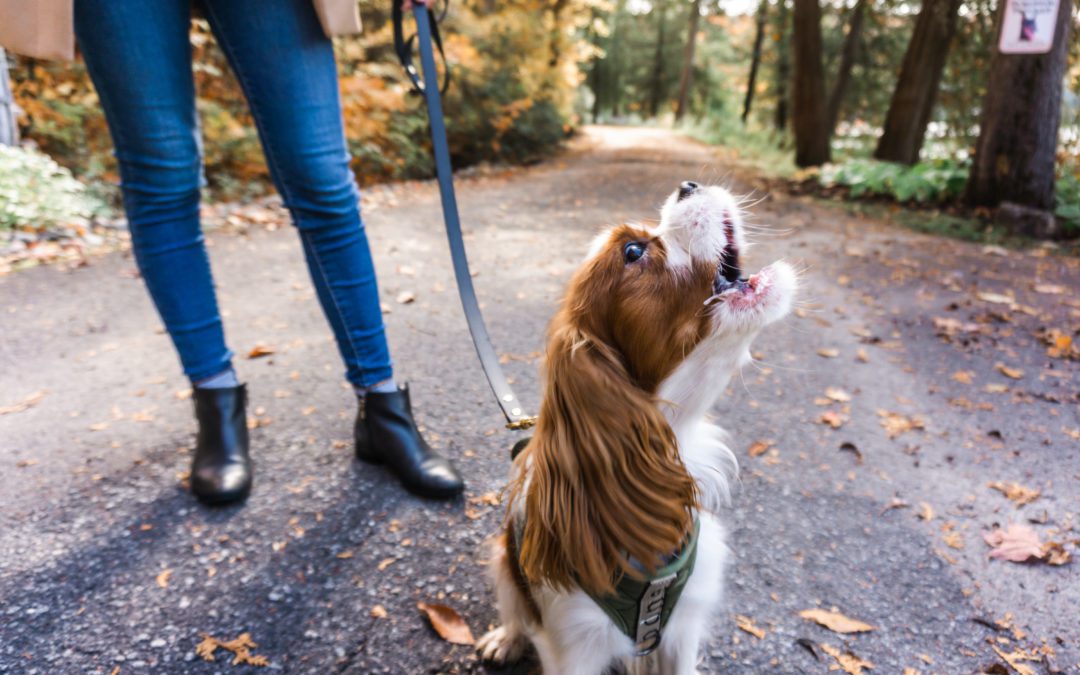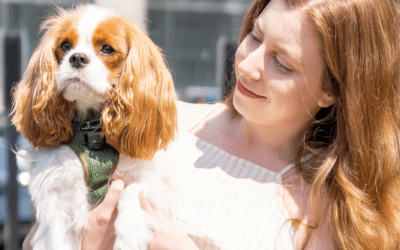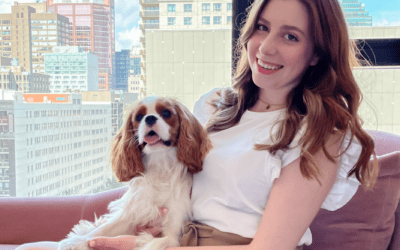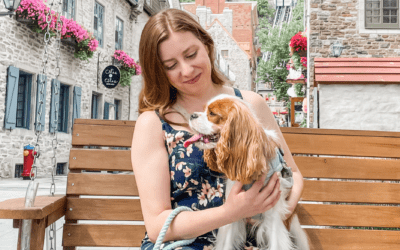Do Cavaliers Bark? Tips For Quieting Anxious Barking
Do Cavaliers bark? Short answer: yes.
They don’t all bark, but our Cavalier King Charles Spaniels does. Because it got past the point of being cute, we decided to seek the help of a trainer to get the anxious, reactive barking under control.
A few months ago, we never thought that Henry would ever be able to ignore a flying leaf and walk beside us without barking or pulling his leash.
But guess what, now he can!
Want to know how we did it? Keep reading.
Follow @henrythesmol on social media!
DISCLAIMER: I am not a trainer, nor a professional in the pet health space. Every dog is different and has different training needs. Different training methods work for different dogs. What worked for Henry may not work for your dog.
Does your cavalier bark? If you’re having similar behavioral issues, reach out to a trainer whose methods line up with your values. In the case of excessive barking and extreme behaviour, it may be a good idea to visit your vet.

HENRY THE SMOL
We really just thought that’s “how he was” and he’d “get over it with time”. Anxious barking never crossed our mind.
Do Cavaliers Bark? We Chose One Because They Don’t…Or So We Thought
When we were first doing our research on the breed, we found that Cavaliers made great apartment dogs: they’re sweet-natured, gentle, affectionate, calm lap dogs that are eager to please and adapt very well to any environment.
Our first question to any breeder we’d call was “Do Cavaliers bark?”
Basically, we chose a Cavalier because they didn’t bark.
A full description is available on the Canadian Kennel Club website here. If you’re looking for a Cavalier breeder, I suggest reading this blog post first.
Although very gentle and affectionate, Henry is by no means calm. And come to think of it, he never really was. Ever since he threw his first punch in the pen with his littermates, we knew this dog was full of personality!
Does Your Cavalier Bark Because They’re Anxious?
As a puppy, Henry barked for attention, when he played, when the doorbell rang and for a bit when we left. At the beginning, we never thought it was anxious barking. We really just thought that’s “how he was” and he’d “get over it with time”.
Truth is, as time passed, his anxiety and reactive behavior got worse. And soon, this Cavalier barked all the time.
Growing up, he became increasingly reactive on walks, barking at almost all moving distractions and pulling the leash. Leaves and birds were the worst triggers. And windy days? Forget it. As you can imagine, at this point, walks became unbearable, and with every walk, we became increasingly frustrated and embarrassed (imagine having non-dog-people judge you or bark at you…I wish I were making that up).
We tried a few training tactics we found online, but nothing worked. Feeling hopeless, we started to seriously consider bootcamp, until we came across an excellent positive reinforcement trainer in Montreal.
New dog mom? Here are some tips for getting through those puppyhood struggles.
And if you’re bringing home a new puppy soon, you can find my list of essentials here.

Why Do Cavaliers Bark? Understanding It All.
Vanessa Paré (@edu.concept.chien on Insta!) is a trainer who promotes canine education by concepts: instead of teaching your dog while you’re in a given situation, she teaches you and your dog to prepare for that situation.
Visit educonceptchien.com for more dog training info!
This method works very well for us, because Henry is an anxious dog. Just like anxiety in humans, anxious dogs can be triggered by expectations. For instance, the anxious barking will start when the phone rings and we answer with “Yes, hello”. Henry is triggered by those words, and barks thinking someone will come to the door.
Thus, he’s learned to expect a delivery when we answer the phone. When we’re out on a walk, he’s learned to pull the leash to try to chase something like a leaf. He gets frustrated when he doesn’t get what he wants, so he barks. The same reaction ensues when he sees a bird he can’t catch.
Initially, we thought that Henry just had “too much energy”, so we tried to fix this by going on more walks. Turns out, for an anxious dog like Henry, this was not the best idea. In fact, our trainer explained that for Henry, his “stress bucket” was overflowing with stimuli and triggers due to all these extra walks.
So, before we could tackle the walks, we had to take a step back and look at the general “issue” at hand: calm. It was impossible to tackle every single little trigger at once; Henry had a difficult time being and staying calm.
For our list of essential city dog walk items, click here.
How “Ditching The Routine” Helped To Calm The Barking
You’ll never guess the first piece of advice given by our trainer! This made me laugh because we always thought dogs thrive on routine. But, to reduce the anxious barking, our trainer suggested we “ditch the routine”, or in other words break down his triggers and expectations.
Easier said than done! Everything we normally did, we had to do at a different time or in a different way, and reward Henry without him expecting it. For example, we started randomly answering the phone and throwing treats on the floor, or feeding Henry at a different time in the day, or spreading out his meals throughout the day, etc.
In this way, Henry could associate the usual triggers with things that are just “normal” mundane activities. The idea was that eventually he’d learn not to get excited or anxious about them.
Find A Calm Place For Your Anxious Dog
Another aspect of this training was self-control. We were given a couple of games to practice a few minutes a day to help with calm. But before jumping into these, we had to establish a calm place.
This calm place can be a blanket, a bed or a crate. For us, it’s his bed (literally the only bed he hasn’t ever tried to destroy or play with! Thank you Maxbone!) To reinforce this idea, we reward Henry with treats, filled Kongs and chews on his bed. Over time, he’s learned that his bed is a place where he can relax. Now, he just goes there on his own to hang out. Keep reading for links to shop these items!
In a few months, we’ll start working on changing the location of the bed to another room. This may help with Henry’s separation anxiety and foster independence; he’ll learn how to be calm without us having to be in the room. Right now, we’re at the stage where we can work in the office, while Henry relaxes on his bed. This is a huge win for us!
Stopping The Barking Before It Happens
Once we were able to get things a little more under control at home, it was time to understand why our anxious Cavalier was barking on walks.
Henry pulled the leash, barked at birds and leaves and wanted to greet every human that walked by. With all these triggers, it felt impossible to get anything under control.
We carry treats on every walk. It’s important for us to be preventive and set Henry up for a successful, stress-free walk.
To do this, we had to choose a word that would be our “magic keyword”. Before using it on walks, we had to start off by saying this word, in a neutral tone, at random moments, followed by an immediate treat. This word would get his attention and prevent him from barking at a trigger.
Part two of the walk training: stop the pulling! Our magic keyword reduced the leash pulling a lot already so adding the word “yes” everytime the leash wasn’t “tense” or whenever Henry looked at us, really reinforced the behaviour we wanted!
The toughest part of the training is finding the right moment to reward him; it requires a lot of attention on our part. Coordinating it all is pretty funny: spot the little “alert” moment, say the keyword, reward, repeat, the leash is loose, say “yes”, reward, repeat. Every. Walk.
Yes, training takes consistent effort.
So, Why Do Cavaliers Bark?
Dogs, including Cavaliers, will bark. They need to. Barking is their way of communicating or alerting us. It’s up to us to figure out why, without taking their voice away.
Obviously, I’m generalizing here for the sake of this blog post. Not all Cavaliers bark.
Does my Cavalier bark all the time? Yes. Can it get annoying? Yes. And I can get angry. That’s why training is an everyday, ongoing process that takes effort and patience.
Long term results require long term efforts.
I don’t really believe in quick fixes: we would never consider removing Henry’s vocal chords (which I’ve read actually causes increased anxiety) or making Henry wear a vibrating collar (which doesn’t solve anything, because it doesn’t actually get to the source of why they’re barking), for example.
In sum, with Henry, there is one big “umbrella” concept we’re working on improving, so that other behaviours that fall under this umbrella start to change, like the anxious barking. Our general concept is calm (because he’s so reactive) and within the calm, we have several games and training tips to apply in different scenarios. If you follow us on Instagram, you’ve probably spotted a few examples already (like Henry lying on his bed, or his work with self-control).
We were surprised to see that other Cavaliers in the community bark a lot, too, and many dog parents struggle with this same issue. Our hope is that by sharing this experience, we can help shed some light on your barking situation as well. Finding the right trainer is key: Vanessa has helped us so much with Henry, and we’re super grateful! She’s is so great and is always cheering us on when we share one of our little wins on social media.
Thanks to her we were finally able to understand why our Cavalier was barking and get it under control!
Shop Products Mentioned in This Blog Post
Helpful Links
I’ve included some more links below that I found helpful myself in understanding the sources of anxious, reactive barking. These training ressources, toys and other goodies will help you along your barking journey!
- Training guides, ressources, online classes with Vanessa Paré (she’s our trainer and helped us SO much with Henry!): www.educonceptchien.com
- Ressources for reactive dogs: careforreactivedogs.com/ & reactivedogsoftheworld.com/
- Positive reinforcement training videos with Zack George (great videos for puppy training!): www.dogtrainingrevolution.com
- Tips for reactive dogs (Hannah, blogger extraordinaire behind maggielovesorbit.com, shares her experience and resources on helping her reactive dog Maggie) maggielovesorbit.com/resources-for-reactive-dogs and maggielovesorbit.com/one-year-after-i-realized-my-boston-terrier-is-reactive
- Kong-stuffing recipes to keep your dog busy on their bed (I love Wear Wag Repeat and Proud Dog Mom Blog! So many fun DIYs, recipes and helpful ressources!): wearwagrepeat.com/kong-stuffing-recipes and prouddogmom.com/healthy-treats-stuff-kong-toy/
- Kongs, interactive toys and games (itmes we’ve tried and tested in my Amazon.ca shop here and Amazon.com shop here)
- More product recommendations here!
When dog mama needs a break from all this training:
- Pretty Fluffy: the leading online lifestyle destination for dog lovers (my fave and basically dog blogger goals): prettyfluffy.com
- Gal’s Best Friend: the modern-day dog moms (love these ladies, also the co-founders of thepetsummit.com!): galsbestfriend.com
- Lindsey & Coco: the curated dog mom lifestyle (My blogger bestie! Everything dog mom lifestyle. I just love her style and shopping posts): lindseyandcoco.com
6 Comments
Trackbacks/Pingbacks
- 5 City Dog Walk Essentials | Henry The Smol - […] Henry doesn’t bark on walks anymore. You can read all about our training and quieting anxious … […]
- Preparing for Puppy: What You Need To Welcome A Dog | Henry The Smol - […] If you want your dog to enjoy their calm place, read this blog post for some training tips! […]
- How To Find A Cavalier King Charles Spaniel Breeder | Henry The Smol - […] *Fast forward to a year later, they actually do bark, like my Henry who is a reactive dog. Read…
- 5 Tips to Overcome Puppyhood Struggles | Henry The Smol - […] When the pandemic hit, dog trainers transitioned to private or online classes. I highly recommend Vanessa Paré, of educonceptchien.com.…
- Gift Guide: Must-Haves For Any Dog Lover | Henry The Smol - […] can read more about how I train my anxious, reactive Henry here and all the essentials I bring on…
- 4 Things I've Learned So Far As A First-Time Dog Mom | Henry The Smol - […] you’re interested in finding out how we did it, this blog post goes into detail about Henry’s reactive […]
Submit a Comment
Enjoyed this blog post? You might also dig these:
The “Tea” On Cavology Dog Accessories For Fall 2021
Fall 2021’s must-have dog accessories are Cavology’s latest drop, inspired by a cup of your favorite herbal teas! Shop high-quality, stylish harnesses, leashes and more in this blog post.
4 Things I’ve Learned So Far As A First-Time Dog Mom
After two years as a first-time dog mom, I’ve learned a lot. Here are 4 realizations I’ve come to along the way.
Dog-Friendly Quebec City: Our Dog’s First Road Trip
Exploring dog-friendly Quebec City on our first ever road trip with Henry! Read more to learn about how we planned and the fun places we visited with our dog.
This website is a participant in the Amazon Services LLC Associates Program, an affiliate advertising program designed to provide a means for sites to earn advertising fees by advertising and linking to amazon.com. As an Amazon Associate, I earn from qualifiying purchases. Please keep in mind that some of the links included in this blog post are affiliate links and if you go through them to buy something, I will earn a commission. The decision to purchase something is completely and totally up to you. If you do decide to purchase something from one of these links, I thank you for supporting Henry The Smol’s blog!





tHATS PRETTY INTENSE EFFORT AND INTROSPECTION CARA! KEEP IT UP AND IM SURE THE EFFORT WILL PAY OFF. THE BEST PART IS THAT HENRY IS SALVAGEABLE!! YOU CAN SEE THE TRANSITION AND HE DOES IN FACT RESPOND TO POSITIVE ENERGY! STAY STEADY AND CALM !
It definitely requires a lot of effort, and we’re nowhere near done, but it’s all worth it in the end when we can have enjoyable walks!!! Eventually he’ll be able to stop barking while we’re eating too LOL SOMEDAY!
Hi Cara! My little Charlie is the same. He’s very reactive on walks and barks like crazy every time the doorbell rings. We got Charlie in DEC.2019 AND DID SO WELL SOCIALIZING HIM TILL MARCH OF 2020. THEN QUARATINE HAPPENED AND ALL THOSE TRIPS TO STORES AND MALLS, DOG MEET UPS WENT DOWN THE TUBE! SO WHEN WE WERE GIVEN A LITTLE BIT OF FREEDOM LAST SUMMER CHARLIE TURNED INTO THIS ANXIOUS REACTIVE DOG. I SAW A VET BEHAVIORIST AND CHARLIE WAS PUT ON MEDS ( TO BE HONEST DIDN’T SEE AN IMPROVEMENT) WE MET WITH MULTIPLE TRAINORS AND I’M FINALLY SEEING A BIT OF IMPROVEMENT NOW. WE ARE ABLE TO GO ON CAR RIDES AND TAKE WALKS AS LONG AS HE DOESN’T SEE OTHER DOGS. HE DOES STILL pull and BARK BUT I TRY MY BEST TO DIVERT HIS ATTENTION WITH TREATS. HE’S JUST SUCH A FRIENDLY GUY WHO JUST WANTS TO LICK AND PLAY WITH EVERYONE. Thanks for giving me some hope! I look forward to your Clubhouse chats every week!
Aww Charlie!!! I can totally relate. It was a struggle and so frustrating for so long…and still can be sometimes. With Henry we truly work at it every walk, every day. It’s just become a habit now 🙂 Good luck with the training and we’ll chat on Clubhouse soon!!
Thank you for such an insightful post. Our freddie is 8 months old and suddenly doesnt like noises or smells of other animals in the back garden. we’ve hired a trainer to help us because i realised that if we don’t learn how to help him, it could be a lifelong issue.
he becomes super wired and just wants to bolt outside and bark for a bit and continue running up and down, no matter if he’s been for a long walk.
I have a Charlie Cavalier also! He just turned 9 months old…and yes, he barks at lots of stuff! He moved here last winter and now that it’s Spring and I can try to walk him, he just loves everybody and everything! He barks a lot!And he does also pull on his leash!! He loves the kids around here and they love him! But now that there’s more activity outside being Spring…well, I think you get my point!